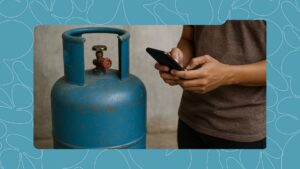
I can’t count how often I’ve been told not to carry my phone close to the gas cooker…CONTINUE FULL READING>>>>>
It’s been drilled into my head so much that I now echo the same warning to my younger siblings and anyone I catch scrolling or answering calls in the kitchen. But the explanations vary wildly: some say it’s not just the phone but when a call comes in, or if your flashlight is on.
Others insist a simple selfie near the stove could spell disaster. So what’s the truth? Can your phone trigger a gas explosion in your kitchen? Or is this one of those age-old myths that’s managed to stick around? Let’s break it down.
Understanding the Nature of Cooking Gas
Home cooking gas, commonly called Liquefied Petroleum Gas (LPG), is a highly flammable mixture of propane and butane. Even in small amounts, it mixes with air and becomes highly volatile when it leaks. This means it can ignite with just a small spark or open flame. The real danger is not the gas itself but what it does when it comes into contact with heat, sparks, or fire.
Can a Phone Cause a Spark?
Mobile phones are low-voltage devices. They don’t naturally produce open flames or intense sparks like a gas lighter or a stove. So, under normal use, your phone is unlikely to cause a gas explosion just by being nearby. However, that doesn’t mean phones are completely harmless in a gas-leak scenario. Let’s explore the risks:
1. Sparks from Faulty Devices or Accessories
While modern smartphones are designed to operate safely, issues like faulty wiring, a damaged battery, or a malfunctioning charger can lead to tiny electrical sparks. If this happens in a room where gas has leaked, that spark, no matter how small, could potentially ignite an explosion.
Even plugging your phone charger into a socket in a gas-filled room is a no-no. Any spark from the electrical connection could set off an explosion if the environment is already saturated with gas.
2. Mobile Phone Radiation: Does It Ignite Gas?
Some fire safety experts suggest that the electromagnetic radiation emitted by mobile phones could, in rare conditions, influence gas particles in the air, especially when the gas concentration is high. The theory is that when radio waves or electromagnetic signals from your phone interact with a highly flammable gas-filled atmosphere, they could increase the risk of ignition, not directly, but by creating the conditions for a spark.
That said, this risk is extremely low and largely theoretical. The bigger risk remains any actual physical spark, such as faulty electronics or static electricity.
3. Clicking, Flashlights, and Myth-Busting
Another belief is that using your phone’s torchlight, or even taking a picture with flash, could cause an explosion. Flashlight beams and LED lights do not generate heat or sparks like open flames. The danger isn’t from the light itself; it’s from what may happen inside the phone when you press a button or activate a feature. If, for instance, clicking your phone’s flashlight triggers internal components to rub or shift, there’s a slight chance a spark could be produced, especially if the device is old, poorly maintained, or malfunctioning. In this scenario, the risk isn’t about the torchlight but the internal hardware.
4. Electromagnetic Jams and Parallel Waves
Some reports have discussed how phones and other electronics (like radios or TVs) can emit waves that clash with gas particles in the air. This phenomenon, sometimes referred to as “electromagnetic jams,” may cause instability in the atmosphere, theoretically affecting pressure and potentially contributing to an explosion. Again, this is a rare occurrence, and there’s little hard evidence to show this happens in everyday household environments.
So, Do Phones Cause Gas Explosions?
Not exactly, but they can contribute to the conditions that make an explosion possible, especially in the presence of a significant gas leak.
Here’s what we know for sure:
A healthy, well-functioning phone on its own is unlikely to ignite anything.
If there’s a gas leak, any spark, from a phone, a switch, or a plug, can be dangerous.
Old or faulty devices are riskier and could emit tiny sparks.
If you suspect a gas leak, it’s best not to make calls, plug in devices, or use electronics.
Kitchen Safety Tips to Keep in Mind
Don’t use your phone when cooking over an open flame.
If you smell gas, turn off the source immediately and avoid using electronics.
Never plug or unplug chargers near gas appliances.
Don’t keep damaged phones or chargers in the kitchen.
Ventilate your kitchen regularly to prevent gas buildup.
The idea that your phone alone can blow up your kitchen might be an exaggeration, but it’s rooted in a genuine concern that any electrical device, under the wrong circumstances, can pose a risk when gas is in the air. So, rather than panic, it’s best to stay informed, handle your gadgets responsibly, and always treat gas leaks cautiously.
Safety in the kitchen isn’t only about what’s cooking but also everything around it…CONTINUE FULL READING>>>>>


